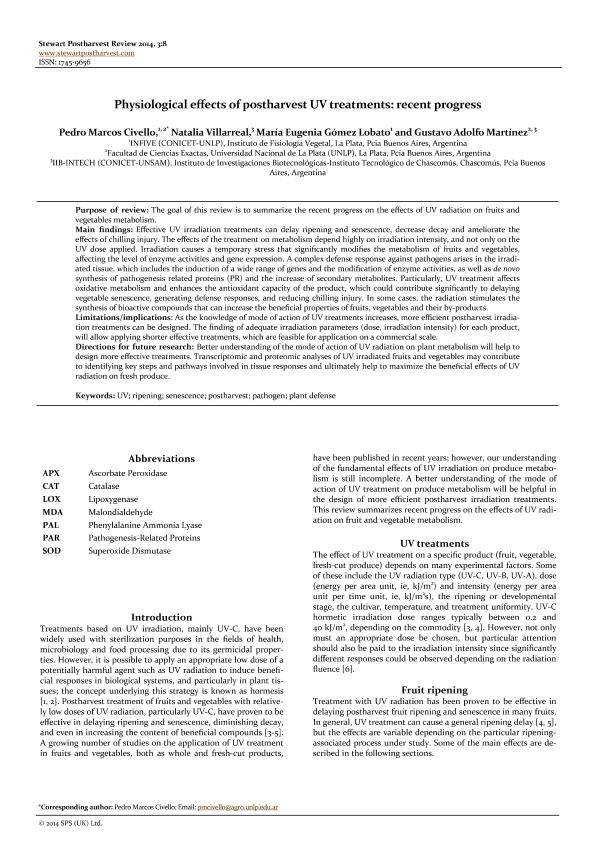Artículo
Physiological effects of postharvest UV treatments: recent progress
Civello, Pedro Marcos ; Villarreal, Natalia Marina
; Villarreal, Natalia Marina ; Gómez Lobato, María Eugenia
; Gómez Lobato, María Eugenia ; Martinez, Gustavo Adolfo
; Martinez, Gustavo Adolfo
 ; Villarreal, Natalia Marina
; Villarreal, Natalia Marina ; Gómez Lobato, María Eugenia
; Gómez Lobato, María Eugenia ; Martinez, Gustavo Adolfo
; Martinez, Gustavo Adolfo
Fecha de publicación:
12/2014
Editorial:
Stewart Postharvest Solutions
Revista:
Stewart Postharvest Review
ISSN:
1745-9656
Idioma:
Inglés
Tipo de recurso:
Artículo publicado
Clasificación temática:
Resumen
Purpose of review: The goal of this review is to summarize the recent progress on the effects of UV radiation on fruits and vegetables metabolism. Main findings: Effective UV irradiation treatments can delay ripening and senescence, decrease decay and ameliorate the effects of chilling injury. The effects of the treatment on metabolism depend highly on irradiation intensity, and not only on the UV dose applied. Irradiation causes a temporary stress that significantly modifies the metabolism of fruits and vegetables, affecting the level of enzyme activities and gene expression. A complex defense response against pathogens arises in the irradiated tissue, which includes the induction of a wide range of genes and the modification of enzyme activities, as well as de novo synthesis of pathogenesis related proteins (PR) and the increase of secondary metabolites. Particularly, UV treatment affects oxidative metabolism and enhances the antioxidant capacity of the product, which could contribute significantly to delaying vegetable senescence, generating defense responses, and reducing chilling injury. In some cases, the radiation stimulates the synthesis of bioactive compounds that can increase the beneficial properties of fruits, vegetables and their by-products. Limitations/implications: As the knowledge of mode of action of UV treatments increases, more efficient postharvest irradiation treatments can be designed. The finding of adequate irradiation parameters (dose, irradiation intensity) for each product, will allow applying shorter effective treatments, which are feasible for application on a commercial scale. Directions for future research: Better understanding of the mode of action of UV radiation on plant metabolism will help to design more effective treatments. Transcriptomic and proteomic analyses of UV irradiated fruits and vegetables may contribute to identifying key steps and pathways involved in tissue responses and ultimately help to maximize the beneficial effects of UV radiation on fresh produce.
Palabras clave:
Postcosecha
,
Maduracion
,
Senescencia
,
Uv
Archivos asociados
Licencia
Identificadores
Colecciones
Articulos(CCT - LA PLATA)
Articulos de CTRO.CIENTIFICO TECNOL.CONICET - LA PLATA
Articulos de CTRO.CIENTIFICO TECNOL.CONICET - LA PLATA
Articulos(IIB-INTECH)
Articulos de INST.DE INVEST.BIOTECNOLOGICAS - INSTITUTO TECNOLOGICO CHASCOMUS
Articulos de INST.DE INVEST.BIOTECNOLOGICAS - INSTITUTO TECNOLOGICO CHASCOMUS
Citación
Civello, Pedro Marcos; Villarreal, Natalia Marina; Gómez Lobato, María Eugenia; Martinez, Gustavo Adolfo; Physiological effects of postharvest UV treatments: recent progress; Stewart Postharvest Solutions; Stewart Postharvest Review; 10; 3; 12-2014; 1-6
Compartir



